Faculty Publications
2018 Publications
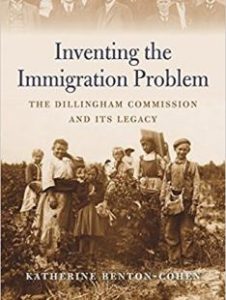
Katherine Benton-Cohen
Inventing the Immigration Problem: The Dillingham Commission and Its Legacy
Harvard University Press, 2018
In 1907 the U.S. Congress created a joint commission to investigate what many Americans saw as a national crisis: an unprecedented number of immigrants flowing into the United States. Experts―women and men trained in the new field of social science―fanned out across the country to collect data on these fresh arrivals. The trove of information they amassed shaped how Americans thought about immigrants, themselves, and the nation’s place in the world. Katherine (Katie) Benton-Cohen argues that the Dillingham Commission’s legacy continues to inform the ways that U.S. policy addresses questions raised by immigration, over a century later.
Within a decade of its launch, almost all of the commission’s recommendations―including a literacy test, a quota system based on national origin, the continuation of Asian exclusion, and greater federal oversight of immigration policy―were implemented into law. Inventing the Immigration Problem describes the labyrinthine bureaucracy, broad administrative authority, and quantitative record-keeping that followed in the wake of these regulations. Their implementation marks a final turn away from an immigration policy motivated by executive-branch concerns over foreign policy and toward one dictated by domestic labor politics.

Christopher S. Celenza
The Intellectual World of the Italian Renaissance: Language, Philosophy, and the Search for Meaning
Cambridge University Press, 2018
In this book, Christopher Celenza provides an intellectual history of the Italian Renaissance during the long fifteenth century, from c.1350-1525. His book fills a bibliographic gap between Petrarch and Machiavelli and offers clear case studies of contemporary luminaries, including Leonardo Bruni, Poggio Bracciolini, Lorenzo Valla, Marsilio Ficino, Angelo Poliziano, and Pietro Bembo. Integrating sources in Italian and Latin, Celenza focuses on the linked issues of language and philosophy. He also examines the conditions in which Renaissance intellectuals operated in an era before the invention of printing, analyzing reading strategies and showing how texts were consulted, and how new ideas were generated as a result of conversations, both oral and epistolary. The result is a volume that offers a new view on both the history of philosophy and Italian Renaissance intellectual life. It will serve as a key resource for students and scholars of early modern Italian humanism and culture.
Ananya Chakravarti
The Empire of Apostles: Religion, Accommodation, and the Imagination of Empire in Early Modern Brazil and India
Oxford University Press, 2018
This book recovers the religious roots of Europe’s first global order, by tracing the evolution of a religious vision of empire through the lives of Jesuits working in the missions of early modern Brazil and India. These missionaries struggled to unite three commitments: to their local missionary space; to the universal Church; and to the global Portuguese empire. Through their attempts to inscribe their actions within these three scales of meaning—local, global, and universal—a religious imaginaire of empire emerged.
This book places cultural encounters in Brazil and India at the heart of an intellectual genealogy of imperial thinking, considering both indigenous and European experiences. Thus, it offers a unique, sustained study of the foundational moment of early modern European engagement in both South Asia and Latin America. In doing so, it highlights the difference between the messy realities of power in colonial spaces and the grandiose discursive productions of an empire that attended these activities. This is the central puzzle of the book: how European accommodation of local peoples and their cultures, the experience of give-and-take in the non-European world, and their numerous failures could lead to a consolidation of an enduring vision of cultural and political dominion.
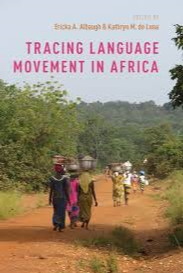
Ericka A. Albaugh (ed.) and Kathryn de Luna (ed.)
Tracing Language Movement in Africa
Oxford University Press, 2018
The great diversity of ethnicities and languages in Africa encourages a vision of Africa as a fragmented continent, with language maps only perpetuating this vision by drawing discrete language groups. In reality, however, most people can communicate with others within and across linguistic boundaries, even if not in languages taught or learned in schools.
Many disciplines have looked carefully at language movement and change on the continent, but their lack of interaction has prevented the emergence of a cohesive picture of African languages. Tracing Language Movement in Africa gathers eighteen scholars together to offer a truly multidisciplinary representation of language in Africa, combining insights from history, archaeology, religion, linguistics, political science, and philosophy. The resulting volume illuminates commonalities and distinctions in these disciplines’ understanding of language change and movement in Africa. The volume is empirical—aiming to represent language more accurately on the continent—as well as theoretical. It identifies the theories that each discipline uses to make sense of language movement in Africa in plain terms and highlights the themes that cut across all disciplines: how scholars use data, understand boundaries, represent change, and conceptualize power. The volume is organized to reflect differing conceptions of language that arise from its discipline-specific contributions: that is, tendencies to study changes that consolidate language or those that splinter it, viewing languages as whole or in part.
Each contribution includes a short explanation of a discipline’s theoretical and methodological approaches to language movement and changes to ensure that the chapters are accessible to non-specialists, followed by an illustrative empirical case study. This volume will inspire multidisciplinary conversations around the study of language change in Africa, opening new interdisciplinary dialogue and spurring scholars to adapt the questions, data, and methods of other disciplines to the problems that animate their own fields.

Dagomar Degroot
The Frigid Golden Age: Climate Change, the Little Ice Age, and the Dutch Republic, 1560-1720
Cambridge University Press, 2018
Dagomar Degroot offers the first detailed analysis of how a society thrived amid the Little Ice Age, a period of climatic cooling that reached its chilliest point between the sixteenth and eighteenth centuries. The precocious economy, unusual environment, and dynamic intellectual culture of the Dutch Republic in its seventeenth-century Golden Age allowed it to flourish as neighboring societies unraveled in the face of extremes in temperature and precipitation. By tracing the occasionally counterintuitive manifestations of climate change from global to local scales, Degroot finds that the Little Ice Age presented not only challenges for Dutch citizens but also opportunities that they aggressively exploited in conducting commerce, waging war, and creating culture. The overall success of their Republic in coping with climate change offers lessons that we would be wise to heed today, as we confront the growing crisis of global warming.

Maurice Jackson (ed.) and Blair Ruble (ed.)
D.C. Jazz: Stories of Jazz Music in Washington, D.C.
Georgetown University Press, 2018
The familiar history of jazz music in the United States begins with its birth in New Orleans, moves upstream along the Mississippi River to Chicago, then by rail into New York before exploding across the globe. That telling of history, however, overlooks the pivotal role the nation’s capital has played for jazz for over a century. Some of the most important clubs in the jazz world have opened and closed their doors in Washington, D.C., some of its greatest players and promoters were born there and continue to reside in the area, and some of the institutions so critical to national support of this uniquely American form of music, including Congress, the Smithsonian Institution, the Kennedy Center, the Library of Congress and the Historical Society of Washington, D.C., are rooted in the city. Closer to the ground, a network of local schools like the Duke Ellington High School for the Performing Arts, jazz programs at the University of the District of Columbia and Howard University, churches, informal associations, locally focused media, and clubs keep the music alive to this day. Noted historians Maurice Jackson and Blair Ruble, editors of this book, present a collection of original and fascinating stories about the D.C. jazz scene throughout its history, including a portrait of the cultural hotbed of Seventh and U Streets, the role of jazz in desegregating the city, a portrait of the great Edward “Duke” Ellington’s time in D.C., notable women in D.C. jazz, and the seminal contributions of the University of District of Columbia and Howard University to the scene. The book also includes three jazz poems by celebrated Washington, D.C., poet E. Ethelbert Miller. Collectively, these stories and poems underscore the deep connection between creativity and place. A co-publishing initiative with the Historical Society of Washington, D.C., the book includes over thirty museum-quality photographs and a guide to resources for learning more about D.C. jazz.
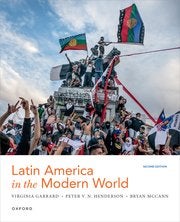
Virginia Garrard, Peter V. N. Henderson, and Bryan McCann
Latin America in the Modern World
Oxford University Press, 2018
Latin America in the Modern World is the first text to situate the history of Latin America within a wider global narrative. Written by leading scholars, the book focuses on five themes: state formation; the construction of national identity through popular culture and religion; economics and commodities; race, class, and gender; and the environment. Emphasizing the distinct experiences of each of the Latin American countries, the book provides students with an entry point into understanding this vital region. Instead of suggesting that all Latin American nations have an interchangeable heritage, the authors seek to clearly identify themes, topics, people, and intellectual currents that help to knit the history of modern Latin America into a coherent category of study. While providing in-depth coverage of the history of the three largest Latin American countries (Mexico, Brazil, and Argentina), Latin America in the Modern World also offers case studies from almost all of the countries, including Central American and Andean nations.

John Tutino
The Mexican Heartland: How Communities Shaped Capitalism, a Nation, and World History, 1500-2000
Princeton University Press, 2018
The Mexican Heartland provides a new history of capitalism from the perspective of the landed communities surrounding Mexico City. In a sweeping analytical narrative spanning the sixteenth century to today, John Tutino challenges our basic assumptions about the forces that shaped global capitalism―setting families and communities at the center of histories that transformed the world.
Despite invasion, disease, and depopulation, Mexico’s heartland communities held strong on the land, adapting to sustain and shape the dynamic silver capitalism so pivotal to Spain’s empire and world trade for centuries after 1550. They joined in insurgencies that brought the collapse of silver and other key global trades after 1810 as Mexico became a nation, then struggled to keep land and self-rule in the face of liberal national projects. They drove Zapata’s 1910 revolution―a rising that rattled Mexico and the world of industrial capitalism. Although the revolt faced defeat, adamant communities forced a land reform that put them at the center of Mexico’s experiment in national capitalism after 1920. Then, from the 1950s, population growth and technical innovations drove people from rural communities to a metropolis spreading across the land. The heartland urbanized, leaving people searching for new lives―dependent, often desperate, yet still pressing their needs in a globalizing world.
A masterful work of scholarship, The Mexican Heartland is the story of how landed communities and families around Mexico City sustained silver capitalism, challenged industrial capitalism―and now struggle under globalizing urban capitalism.
2017 Publications

Christopher S. Celenza
Petrarch: Everywhere a Wanderer
Reaktion Books, 2017
Born in Tuscany in 1304, Italian poet Francesco Petrarca is widely considered one of the fathers of the modern Italian language. Though his writings inspired the humanist movement and subsequently the Renaissance, Petrarch remains misunderstood. He was a man of contradictions—a Roman pagan devotee and a devout Christian, a lover of friendship and sociability, yet intensely private.
In this biography, Christopher S. Celenza, Dean of Georgetown College and Professor of History and Classics, revisits Petrarch’s life and work for the first time in decades, considering how the scholar’s reputation and identity have changed since his death in 1374. He brings to light Petrarch’s unrequited love for his poetic muse, the anti-institutional attitude he developed as he sought a path to modernity by looking backward to antiquity, and his endless focus on himself. Drawing on both Petrarch’s Italian and Latin writings, this is a revealing portrait of a figure of paradoxes: a man of mystique, historical importance, and endless fascination. It is the only book on Petrarch suitable for students, general readers, and scholars alike.
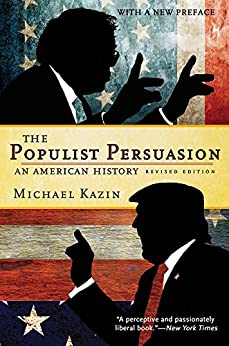
Michael Kazin
The Populist Persuasion: An American History, Revised Edition with a New Preface
Cornell University Press, 2017
In The Populist Persuasion, the distinguished historian Michael Kazin guides readers through the expressions of conflict between powerful elites and “the people” that have run through our civic life, filling it with discord and meaning from the birth of the United States until the present day.
Kazin argues persuasively that the power of populism lies in its adaptable nature. Across the political spectrum, commentators paste the label on forces and individuals who really have just one big thing in common: they are effective at blasting “elites” or “the establishment” for harming the interests and betraying the ideals of “the people” in nations that are committed, at least officially, to democratic principles. Kazin’s classic book has influenced debates over populism since its publication. The new preface to this edition brings the story up to date by charting the present resurgence of populist discourse, which was front and center in the 2016 elections and in the Brexit debate.

Michael Kazin
War Against War: The American Fight for Peace, 1914-1918
Simon & Schuster, January 2017
The untold story of the movement that came close to keeping the United States out of the First World War. This book is about the Americans who tried to stop their nation from fighting in one of history’s most destructive wars and then were hounded by the government when they refused to back down. In the riveting War Against War, Michael Kazin brings us into the ranks of the largest, most diverse, and most sophisticated peace coalition up to that point in US history. They came from a variety of backgrounds: wealthy and middle and working class, urban and rural, white and black, Christian and Jewish and atheist. They mounted street demonstrations and popular exhibitions, attracted prominent leaders from the labor and suffrage movements, ran peace candidates for local and federal office, and founded new organizations that endured beyond the cause. For almost three years, they helped prevent Congress from authorizing a massive increase in the size of the US army—a step advocated by ex-president Theodore Roosevelt. Soon after the end of the Great War, most Americans believed it had not been worth fighting. And when its bitter legacy led to the next world war, the warnings of these peace activists turned into a tragic prophecy—and the beginning of a surveillance state that still endures today. War Against War is a dramatic account of a major turning point in the history of the United States and the world.
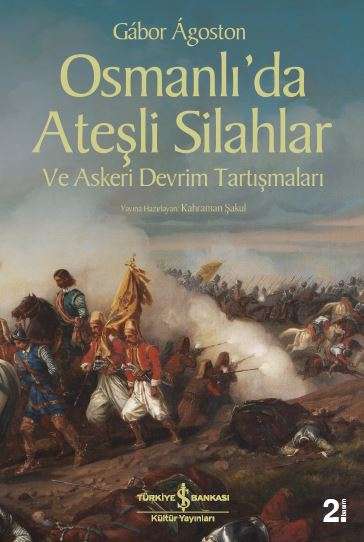
Gabor Agoston
Osmanlı’da Ateşli Silahlar ve Askeri Devrim Tartışmaları
Is Bankasi Kültür Yayinlari, 2017
This edited volume, containing Turkish translations of Prof. Agoston’s articles on Ottoman military history, further confirms his reputation as the leading historian in this field. With a foreword by Jeremy Black, the work is translated by Kahraman Sakul, Georgetown Ph.D. 2009.
Emmet Curran (Professor Emeritus)
Intestine Enemies: Catholics in Protestant America, 1605-1791
Catholic University of America Press, May 2017
This volume is a documentary survey of the experience of Roman Catholics in the British Atlantic world from Maryland to Barbados and Nova Scotia to Jamaica over the course of the two centuries that spanned from colonization to independence. It covers the first faltering efforts of the British Catholic community to establish colonies in the late sixteenth and early seventeenth centuries; to their presence in the proprietary and royal colonies of the seventeenth century where policies of formal or practical toleration allowed Catholics some freedom for civic or religious participation; to their marginalization throughout the British Empire by the political revolution of 1688; to their transformation from aliens to citizens through their disproportionate contribution to the wars in the latter half of that century as a consequence of which half of the colonies of Britain’s American Empire gained their independence. The work organizes representative documents from a wide array of public and private records—broadsides, newspapers, and legislative acts to correspondence, diaries, and reports—into topical chapters bridged by contextualized introductions. It affords students and readers, in general, the opportunity to have first-hand access to history.
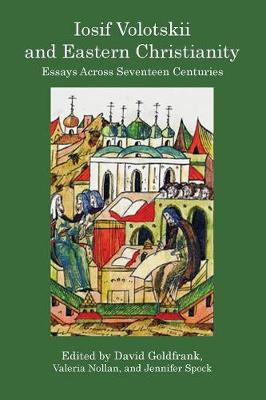
David Goldfrank and Nollan Valeria, eds.
Iosif Volotskii and Eastern Christianity: Essays Across Seventeen Centuries
New Academia, April 2017
September 9, 2015, marked the 500th anniversary of the passing of one of the most commanding and remarkable figures in Russian history, Iosif Volotskii. It was in his honor that the Association for the Study of Eastern Christian History and Culture held its biennial conference in March 2013, where the first drafts of this volume’s essays were presented. The first section of this volume looks at early Eastern Church history. The middle section is devoted to Iosif, a passionate and engaged activist, and how some of his interests played out in early modern Russia in places where religion remained paramount. How he and any other zealous late medieval abbot, teacher, and father confessor would have related to the issues taken up in the third section on our modern, technologically explosive era is impossible to fathom, but reminds us, as he did his monks, of such timeless wisdom as “it is a great calamity where laws and canons do not dwell.”

George Vrtis and John McNeill, eds.
Mining in North America: An Environmental History since 1522
University of California Press, July 2017
Over the past five hundred years, North Americans have increasingly relied on mining to produce much of their material and cultural life. From cell phones and computers to cars, roads, pipes, pans, and even wall tiles, mineral-intensive products have become central to North American societies. As this process has unfolded, mining has also indelibly shaped the natural world and the human societies within it. Mountains have been honeycombed, rivers poisoned, and forests leveled, and the consequences of these environmental transformations have fallen unevenly across North America.
Drawing on the work of scholars from Mexico, the United States, and Canada, Mining North America examines these developments. It covers an array of minerals and geographies while bringing mining into the core debates that animate North American environmental history. Taken all together, the essays in this book make a powerful case for the centrality of mining in forging North American environments and societies.
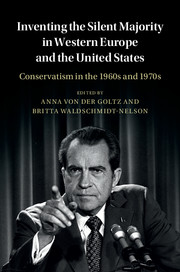
Anna von der Goltz & Britta Waldschmidt-Nelson, eds.
Inventing the Silent Majority in Western Europe and the United States: Conservatism in the 1960s and 1970s
Cambridge University Press, 2017
Inventing the Silent Majority in Western Europe and the United States examines the unprecedented mobilization and transformation of conservative movements on both sides of the Atlantic during a pivotal period in postwar history. Convinced that ‘noisy minorities’ had seized the agenda, conservatives in Western Europe and the United States began to project themselves under Nixon’s popularized label of the ‘silent majority’. The years between the early 1960s and the late 1970s witnessed the emergence of countless new political organizations that sought to defend the existing order against a perceived left-wing threat from the resurgence of a new, politically organized Christian right to the beginnings of a radicalized version of neoliberal economic policy. Bringing together new research by leading international scholars, this ground-breaking volume offers a unique framework for studying the phenomenon of conservative mobilization from a comparative and transnational perspective.
2016 Publications
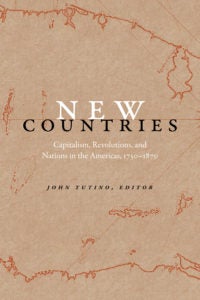
John Tutino, ed.
New Countries: Capitalism, Revolutions, and Nations in the Americas, 1750–1870
Duke University Press, 2016
With contributions by Adam Rothman and Erick Langer
After 1750 the Americas lived political and popular revolutions, the fall of European empires, and the rise of nations as the world faced a new industrial capitalism. Political revolution made the United States the first new nation; revolutionary slaves made Haiti the second, freeing themselves and destroying the leading Atlantic export economy. A decade later, Bajío insurgents took down the silver economy that fueled global trade and sustained Spain’s empire while Britain triumphed at war and pioneered industrial ways that led the U.S. South, still-Spanish Cuba, and a Brazilian empire to expand slavery to supply rising industrial centers. Meanwhile, the fall of silver left people from Mexico through the Andes searching for new states and economies. After 1870 the United States became an agro-industrial hegemon, and most American nations turned to commodity exports, while Haitians and diverse indigenous peoples struggled to retain independent ways.
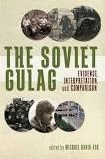
Michael David-Fox, ed.
The Soviet Gulag: Evidence, Interpretation, and Comparison
The University of Pittsburgh Press, November 2016
Before the collapse of the Soviet Union and the subsequent archival revolution, Aleksandr Solzhenitsyn’s famous “literary investigation” The Gulag Archipelago was the most authoritative overview of the Stalinist system of camps. This volume develops a much more thorough and nuanced understanding of the Gulag. It brings a greater awareness of the wide variety of camps, the forced labor system, and the Gulag as viewed in a global historical context, among many other topics. It also offers fascinating new interpretations of the interrelationship and importance of the Gulag to the larger Soviet political and economic system, and how they were in fact, parts of the same entity.
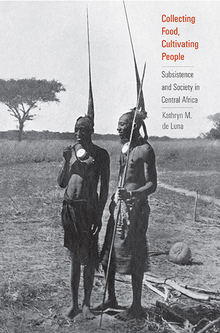
Kathryn M. de Luna
Collecting Food, Cultivating People: Subsistence and Society in Central Africa
Yale University Press, September 2016
Engaging new linguistic evidence and reinterpreting published archaeological evidence, this sweeping study explores the place of bushcraft and agriculture in the precolonial history of south-central Africa across nearly three millennia. Contrary to popular conceptions that place farming at the heart of political and social change, political innovation in precolonial African farming societies was actually contingent on developments in hunting, fishing, and foraging, as de Luna reveals.
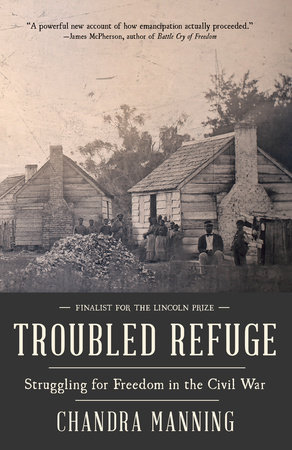
Chandra Manning
Troubled Refuge: Struggling for Freedom in the Civil War
Knopf, August 2016
By the end of the Civil War, nearly half a million slaves had taken refuge behind Union lines, in what became known as “contraband camps.” These were crowded, dangerous places, yet some 12-15 percent of the Confederacy’s slave population took almost unimaginable risks to reach them, and they became the first places Northerners came to know former slaves en masse. Ranging from stories of individuals to those of armies on the move to the debates in Congress, Troubled Refuge probes what the camps were really like and how former slaves and Union soldiers warily united there. This alliance, which would outlast the war, helped to destroy slavery and ward off the surprisingly tenacious danger of re-enslavement. But it also raised unsettling questions about the relationship between American civil and military authority, and reshaped the meaning of American citizenship, to the benefit as well as the lasting cost of African-Americans.
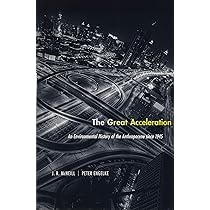
J.R. McNeill and Peter Engelke
The Great Acceleration: An Environmental History of the Anthropocene since 1945
Belknap Press of Harvard University, 2014; reprinted 2016
The Earth has entered a new age-the Anthropocene-in which humans are the most powerful influence on global ecology. Since the mid-twentieth century, the accelerating pace of energy use, greenhouse gas emissions, and population growth have thrust the planet into a massive uncontrolled experiment. The Great Acceleration explains its causes and consequences, including the role of energy systems, as well as trends in climate change, urbanization, and environmentalism.
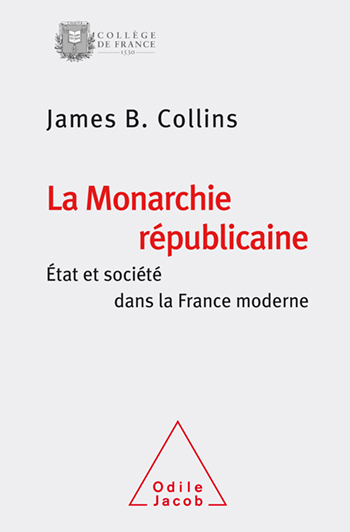
James Collins
La monarchie républicaine: Etat et société dans la France moderne [Republican Monarchy: State and Society in Modern France]
Editions Odile Jacob, 2016
This book, based on a series of invited lectures Professor James Collins gave as Professeur Invité at the Collège de France in 2013, examines what Prof. Collins describes as the system of mixed government characteristic of France before the age of Louis XIV in both the political institutions of the provinces as well as in Paris. A review in Le Figaro, one of France’s leading daily newspapers, describes the book as “a work of very great originality” and “one of the most stimulating reflections on the history of the French Ancien Regime state and society published in many years.”
2015 Publications
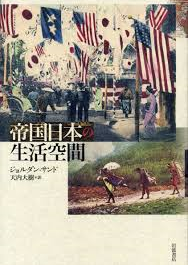
Jordan Sand
帝国日本の生活空間 Living Spaces of the Japanese Empire
Translation by Amanai Daiki
Iwanami Shoten, 2015
Japan’s colonial empire in East Asia and the Pacific during the first half of the twentieth century had more than political and strategic significance. In a variety of ways, it channeled flows of people, goods, and ideas, and forced people into unequal encounters in everyday settings. Empire building thus also built cultural spheres. Taking up cases of houses and interiors, bodily comportment, food and taste, and travel and tourism, this collection of interconnected essays considers the cultural effects of the movement and encounters brought about by the Japanese empire. In Japanese with translation by Amanai Daiki.
John Voll (Professor Emeritus), Tamara Sonn, & John Esposito
Islam and Democracy After the Arab Spring
Oxford University Press, 2015
The landscape of the Middle East has changed dramatically since 2011, as have the political arena and the discourse around democracy. In Islam and Democracy after the Arab Spring, John L. Esposito, John Voll, and Tamara Sonn examine the state of democracy in Muslim-majority societies today. Applying a twenty-first-century perspective to the question of whether Islam is “compatible” with democracy, they redirect the conversation toward a new politics of democracy that transcends both secular authoritarianism and Political Islam. While the opposition movements of the Arab Spring vary from country to country, each has raised questions regarding equality, economic justice, democratic participation, and the relationship between Islam and democracy in their respective countries. Does democracy require a secular political regime? Are religious movements the most effective opponents of authoritarian secularist regimes? Esposito, Voll, and Sonn examine these questions and shed light on how these opposition movements reflect the new global realities of media communication and sources of influence and power. The book is written for a broad readership of scholars and students, policy-makers, and media experts.
Michael Kazin & Maurice Isserman
America Divided: The Civil War of the 1960s, 5th Edition
Oxford University Press, 2015
America Divided: The Civil War of the 1960s, Fifth Edition, is the definitive interpretive survey of the political, social, and cultural history of 1960s America. Written by two top experts on the era–Maurice Isserman, a historian of American radicalism, and Michael Kazin, a specialist in social movements–this book provides a compelling tale of this tumultuous era filled with fresh and persuasive insights. The authors offer strong and thoughtful analysis of such key topics as the U.S. entry into the Vietnam War, youth culture, the New Left, and women and minority groups. Presenting the most even-handed overview of this turbulent period, America Divided defines, discusses, and analyzes all sides of the political, social, and cultural conflicts of the 1960s in a swiftly moving narrative. It is ideal for courses in 1960s America and America since 1945, or for anyone interested in the last fifty years of American History.

John McNeill and Kenneth Pomeranz, Eds.,
The Cambridge World History, Volume VII: Production, Destruction, and Connection, 1750-Present
Part I: Structures, Spaces & Boundary Making
Cambridge University Press, 2015
Since 1750, the world has become ever more connected, with processes of production and destruction no longer limited by land- or water-based modes of transport and communication. Volume 7 of the Cambridge World History series, divided into two volumes, offers a variety of angles of vision on the increasingly interconnected history of humankind. The first volume examines structures, spaces, and processes within which and through which the modern world was created, including the environment, energy, technology, population, disease, law, industrialization, imperialism, decolonization, nationalism, and socialism, along with key world regions. The second volume questions the extent to which the transformations of the modern world have been shared, focusing on social developments such as urbanization, migration, and changes in family and sexuality; cultural connections through religion, science, music, and sport; ligaments of globalization including rubber, drugs, and the automobile; and moments of particular importance from the Atlantic Revolutions to 1989.
Marcia Chatelain
South Side Girls: Growing Up in the Great Migration
Duke University Press, 2015
In South Side Girls Marcia Chatelain recasts Chicago’s Great Migration through the lens of black girls. Focusing on the years between 1910 and 1940, when Chicago’s black population quintupled, Chatelain describes how Chicago’s black social scientists, urban reformers, journalists, and activists formulated a vulnerable image of urban black girlhood that needed protecting. She argues that the construction and meaning of black girlhood shifted in response to major economic, social, and cultural changes and crises and that it reflected parents’ and community leaders’ anxieties about urbanization and its meaning for racial progress. Girls shouldered much of the burden of black aspiration, as adults often scrutinized their choices and behavior, and their well-being symbolized the community’s moral health. Yet these adults were not alone in thinking about the Great Migration, as girls expressed their views as well. Referencing girls’ letters and interviews, Chatelain uses their powerful stories of hope, anticipation, and disappointment to highlight their feelings and thoughts, and in so doing, she helps restore the experiences of an understudied population to the Great Migration’s complex narrative.
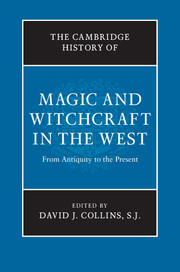
David J. Collins, S.J. (ed.)
Cambridge History of Magic and Witchcraft in the West: From Antiquity to the Present
Cambridge University Press, 2015
The twenty-chapter volume provides a thorough and interdisciplinary overview of the theory and practice of magic in the West in twenty chapters written by experts in their fields. Its chronological scope extends from the Ancient Near East to twenty-first-century North America; its objects of analysis range from Persian curse tablets to U.S. Neopaganism. For comparative purposes, the volume includes chapters on developments in the Jewish and Muslim worlds, which are evaluated not simply for what they contributed at various points to European notions of magic but also as models of alternate development in the Mediterranean world. Similarly, the volume highlights the transformative and challenging encounters of Europeans with non-Europeans regarding the practice of magic in both early modern colonization and more recent decolonization. For more information, see The Cambridge History of Magic and Witchcraft in the West.

Maurice Jackson and Susan Kozel (eds.)
Quakers and Their Allies in the Abolitionist Cause, 1754-1808 Pickering & Chatto Publishers, 2015
The volume explores the significant connections between the Quaker community and the abolitionist cause in America. The case studies that make up the collection mainly focus on the greater Philadelphia area, a hotbed of the abolitionist movement and the location of the first American abolition society founded in 1775. Despite the importance of Quakers to the abolitionist movement, their significance has been largely overlooked in the existing historiography. These studies will be of interest to scholars of slavery and abolition, religious history, Atlantic studies, and American social and political history.
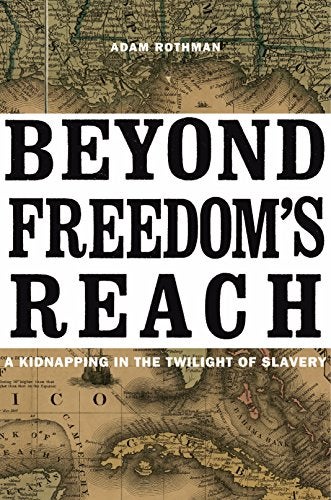
Adam Rothman
Beyond Freedom’s Reach: A Kidnapping in the Twilight of Slavery
Harvard University Press, 2015
In a gripping, meticulously researched account, Adam Rothman details the true story of Rose Herera and her quest to rescue her children from bondage during and after the American Civil War. Born into slavery in rural Louisiana, Rose Herera was bought and sold several times before being purchased by the De Hart family of New Orleans. Still a slave, she married and had children, who also became the property of the De Harts. But after Union forces captured New Orleans in 1862, Herera’s owners fled to Havana, taking three of her small children with them. Just how far the rights of freed slaves extended was unclear to black and white people alike, and so when Mary De Hart returned to New Orleans in 1865 to visit friends, she was surprised to find herself taken into custody as a kidnapper. The case of Rose Herera’s abducted children made its way through New Orleans’ courts, igniting a custody battle that revealed the prospects and limits of justice during Reconstruction. Beyond Freedom’s Reach is an unforgettable human drama and a poignant reflection on the tangled politics of slavery and the hazards faced by so many Americans on the hard road to freedom.
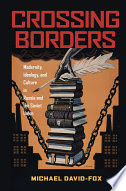
Michael David-Fox
Crossing Borders: Modernity, Ideology, and Culture in Russia and the Soviet Union
University of Pittsburgh, 2015
Crossing Borders deconstructs contemporary theories of Soviet history from the revolution through the Stalin period and offers new interpretations based on a transnational perspective. To Michael David-Fox, Soviet history was shaped by interactions across its borders. By reexamining conceptions of modernity, ideology, and cultural transformation, he challenges the polarizing camps of Soviet exceptionalism and shared modernity and instead strives for a theoretical and empirical middle ground as the basis for creative and richly textured analysis.

Lawrence S. Kaplan
The Conversion of Senator Arthur H. Vandenburg: From Isolation to International Engagement
The University of Kentucky Press, 2015
The United States has looked inward throughout most of its history, preferring to avoid “foreign entanglements,” as George Washington famously advised. After World War II, however, Americans became more inclined to break with the past and take a prominent place on the world stage. Much has been written about the influential figures who stood at the center of this transformation, but remarkably little attention has been paid to Arthur H. Vandenberg (1884–1951), who played a crucial role in moving the nation from its isolationist past to an internationalist future. Vandenberg, a U.S. senator from Michigan (1928-1951) was a key player in the development of NATO. As chairman of the Senate Foreign Relations Committee between 1947 and 1948, Vandenberg helped rally support for President Truman’s foreign policy—including the Marshall Plan—and his leadership contributed to a short-lived era of congressional bipartisanship regarding international relations.
In The Conversion of Senator Arthur H. Vandenberg, Lawrence S. Kaplan offers the first critical biography of the distinguished statesman. He demonstrates how Vandenberg’s story provides a window on the political and cultural changes taking place in America as the country assumed a radically different role in the world, and makes a seminal contribution to the history of U.S. foreign policy during the initial years of the Cold War.
2014 Publications
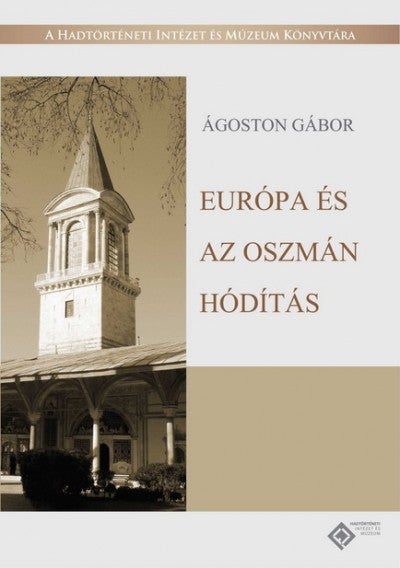
Gabor Agoston
Európa és az Oszmán hódítás [Europe and the Ottoman Conquest]
Budapest: Institute of Military History, 2014
This book is a collection of twenty-two of Professor Agoston’s articles (nineteen written originally in Hungarian, plus the revised and extended Hungarian versions of three recent articles in English). These pieces were all previously published in scholarly journals and edited volumes on the Ottoman conquest in Europe (15-16th centuries), Habsburg-Ottoman relations, Ottoman and Habsburg frontiers, and frontier management, Ottoman information gathering and diplomacy, and so on.
Yvonne Y. Haddad, co-editor with Jane L. Smith
The Oxford Handbook of American Islam
Oxford University Press, 2014
With an up-to-the-minute analysis by thirty-one of the top scholars in the field, this handbook covers the growth of Islam in America from the earliest Muslims to set foot on American soil to the current wave of Islamophobia. Topics covered include the development of African American Islam; pre- and post-WWII immigrants; Sunni, Shi’ite, sectarian, and Sufi Movements in America; the role and status of women, marriage, and family; and the Americanization of Islamic culture.
Throughout these chapters, the contributors explore the meaning of religious identity in the context of race, ethnicity, gender, and politics, both within the American Islamic community and in relation to international Islam.
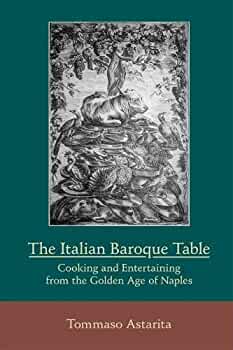
Tommaso Astarita and Antonio Latini
The Italian Baroque Table: Cooking and Entertaining from the Golden Age of Naples
Arizona Center for Medieval & Renaissance Studies, 2014
The Italian Baroque Table offers lovers of food, cooking, history, culture, and Italy a rich introduction to Italian cuisine and hospitality in the 1600s. It translates portions of a cookbook and guidebook to entertaining written by an accomplished cook and steward, accompanied by context, relevant illustrations, and historical notes that allow readers to steep themselves in the culture and practices of the early modern elite Italian kitchen. The emphasis in the original text on local ingredients and customs and on the therapeutic qualities of food will appeal to readers interested in the context of cooking in our era of globalization.
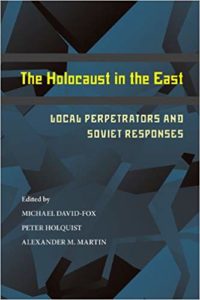
Michael David-Fox, co-editor with Peter Holquist & Alexander M. Martin
The Holocaust in the East: Local Perpetrators and Soviet Responses
The University of Pittsburgh Press, 2014
This volume combines revised articles from the journal Kritika and previously unpublished pieces to offer a probing examination of the complicity of local populations in the mass murder of Jews perpetrated in areas such as Poland, Ukraine, Bessarabia, and northern Bukovina and analyzes Soviet responses to the Holocaust.
Based on Soviet commission reports, news media, and other archives, the contributors examine the factors that led certain local residents to participate in the extermination of their Jewish neighbors; the interaction of Nazi occupation regimes with various sectors of the local population; the ambiguities of Soviet press coverage, which at times reported and at times suppressed information about persecution specifically directed at the Jews; the extraordinary Soviet efforts to document and prosecute Nazi crimes and the way in which the Soviet state’s agenda informed that effort; and the lingering effects of silence about the true impact of the Holocaust on public memory and state responses.
Bryan McCann
Hard Times in the Marvelous City: From Dictatorship to Democracy in the Favelas of Rio de Janeiro
Duke University Press, 2014
Beginning in the late 1970s, activists from the favelas of Rio de Janeiro challenged the conditions—such as limited access to security, sanitation, public education, and formal employment—that separated favela residents from Rio’s other citizens. The activists built a movement that helped to push the nation toward re-democratization. They joined with political allies in an effort to institute an ambitious slate of municipal reforms. Those measures ultimately fell short of aspirations, and soon the reformers were struggling to hold together a fraying coalition. Rio was bankrupted by natural disasters and hyperinflation and ravaged by drug wars. Well-armed drug traffickers had become the new lords of the favelas, protecting their turf through violence and patronage. By the early 1990s, the promise of the favela residents’ mobilization of the late 1970s and early 1980s seemed out of reach. Yet the aspirations that fueled that mobilization has endured, and its legacy continues to shape favela politics in Rio de Janeiro.
Bryan McCann, co-editor with Brodwyn Fischer & Javier Auyero
Cities from Scratch: Poverty and Informality in Urban Latin America
Duke University Press, 2014
This collection of essays challenges long-entrenched ideas about the history, nature, and significance of the informal neighborhoods that house the vast majority of Latin America’s urban poor. Until recently, scholars have mainly viewed these settlements through the prisms of crime and drug-related violence, modernization and development theories, populist or revolutionary politics, or debates about the cultures of poverty. Yet shantytowns have proven both durable and more multifaceted than any of these perspectives foresaw. Far from being accidental offshoots of more dynamic economic and political developments, they are now a permanent and integral part of Latin America’s urban societies, critical to struggles over democratization, economic transformation, identity politics, and the drug and arms trades. Integrating historical, cultural, and social scientific methodologies, this collection brings together recent research from across Latin America, from the informal neighborhoods of Rio de Janeiro and Mexico City, Managua, and Buenos Aires.
Richard Stites [Published posthumously, edited by Catherine Evtuhov and John McNeill]
The Four Horsemen: Riding to Liberty in Post-Napoleonic Europe
Oxford University Press, 2014
In a series of revolts starting in 1820, four military officers rode forth on horseback from obscure European towns to bring political freedom and a constitution to Spain, Naples, and Russia; and national independence to the Greeks. The men who launched these exploits from Andalusia to the snowy fields of Ukraine–Colonel Rafael del Riego, General Guglielmo Pepe, General Alexandros Ypsilanti, and Colonel Sergei Muraviev-Apostol–all hoped to overturn the old order. Over the next six years, their revolutions ended in failure. The men who led them became martyrs.
In The Four Horsemen, the late, eminent historian Richard Stites offers a compelling narrative history of these four revolutions. Stites sets the stories side by side, allowing him to compare events and movements and so illuminate such topics as the transfer of ideas and peoples across frontiers, the formation of an international community of revolutionaries, and the appropriation of Christian symbols and language for secular purposes. He shows how expressive behavior and artifacts of all kinds–art, popular festivities, propaganda, and religion–worked their way to various degrees into all the revolutionary movements and regimes. And he documents as well the corruption, abandonment of liberal values, and outright betrayal of the revolution that emerged in Spain and Naples; the clash of ambitions and ideas that wracked the unity of the Decembrists’ cause; and the civil war that erupted in the midst of the Greek struggle for independence.
Michael David-Fox
Showcasing the Great Experiment: Cultural Diplomacy and Western Visitors to the Soviet Union, 1921-1941 (paperback)
Oxford University Press, 2014
Originally published in 2011 but newly out in paperback, this book describes the 1920s and 1930s pilgrimage of Western visitors and intelligentsia to the Soviet Union, their reaction to what they encountered in the USSR, and Soviet attitudes towards the West as the Soviet Union sought to shape its image abroad and, in particular, to sell the Bolshevik experiment to this Western audience.

R. Emmett Curran
Papist Devils: Catholics in British America, 1574-1783
Catholic University of America Press, 2014
The book is a brief, highly readable history of the Catholic experience in British America, which shaped the development of the colonies and the nascent republic in the seventeenth and eighteenth centuries. Historian Robert Emmett Curran begins his account with the English reformation, which helps us to understand the Catholic exodus from England, Ireland, and Scotland that took place over the nearly two centuries that constitute the colonial period. The deeply rooted English understanding of Catholics as enemies of the political and religious values at the heart of British tradition ironically acted as a catalyst for the emergence of a Catholic republican movement that was a critical factor in the decision of a strong majority of Catholics in 1775 to support the cause for independence.
2013 Publications

Jordan Sand
Tokyo Vernacular: Common Spaces, Local Histories, Found Objects
University of California Press, 2013
Tokyo Vernacular examines local places and objects that embodied vernacular forms of Tokyo’s everyday life following the failure of mass movements in 1960s Japan. In the 1970s, Tokyo began to conserve and celebrate its built environment as part of a global trend that increasingly viewed urban landscapes as essential elements of a nation’s cultural heritage. However, repeated destruction and rapid redevelopment left the city with few buildings of recognized historical value. Moving from the politics of the public square to the invention of neighborhood community, to oddities found and appropriated in the streets, to the consecration of everyday scenes and artifacts as heritage in museums, this volume traces the rediscovery of the past–sometimes in unlikely forms–in a city with few traditional landmarks. Rather than conceiving the city as a national center and claiming public space as national citizens, the post-1960s generation came to value the local places and things that embodied the vernacular language of the city and to seek what could be claimed as the common property outside the spaces of corporate capitalism and the state.

Tommaso Astarita, ed.
A Companion to Early Modern Naples
Brill, 2013
Naples was one of the largest cities in early modern Europe, and for about two centuries the largest city in the global empire ruled by the kings of Spain. Its crowded and noisy streets, the height of its buildings, the number and wealth of its churches and palaces, the celebrated natural beauty of its location, the many antiquities scattered in its environs, the fiery volcano looming over it, the drama of its people’s devotions, the size, and liveliness – to put it mildly – of its plebs, all made Naples renowned and at times notorious across Europe. The new essays in this volume aim to introduce this important, fascinating, and bewildering city to readers unfamiliar with its history.
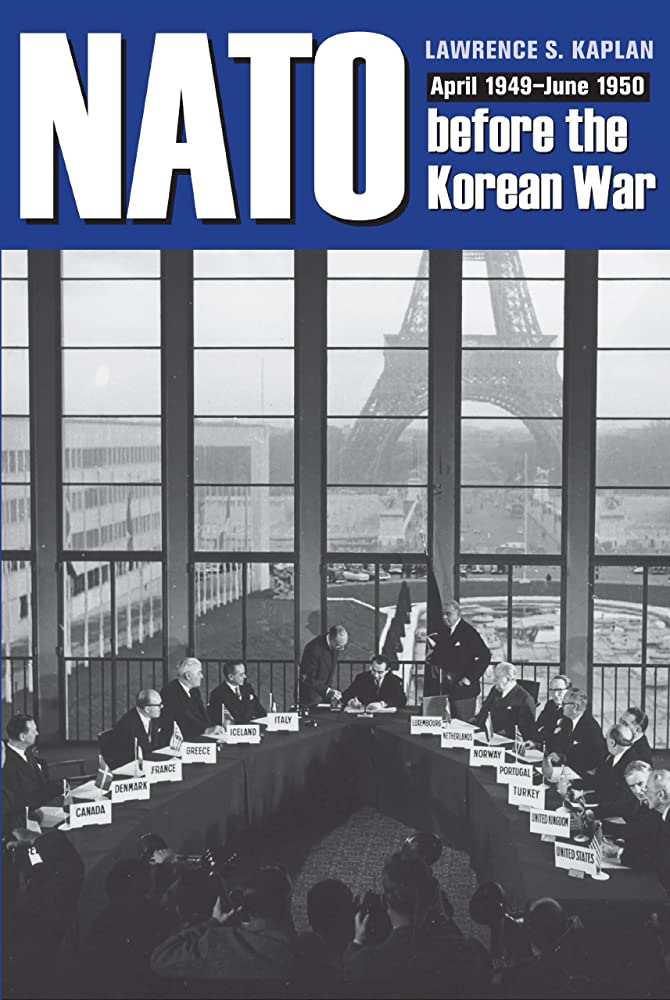
Lawrence Kaplan
NATO Before the Korean War: April 1949 – June 1950
Kent State University Press, 2013
Conventional wisdom has the Korean War putting the “O” in NATO. Prior to that time, from the signing of the North Atlantic Treaty on April 4, 1949, to the North Korean invasion of South Korea on June 25, 1950, the Treaty allies were just going through the motions of establishing an organization. Historian Lawrence Kaplan argues that this is a mistaken view, and he fills in significant blanks in the record of 1949 and 1950, which NATO officials and analysts alike have largely ignored.
James Millward
The Silk Road: A Very Short Introduction
Oxford University Press, 2013
This highly informative volume illuminates the historical background against which the Silk Road flourished, shedding new light on the importance of old-world cultural exchanges to Eurasian and world history. The book treats the Silk Road broadly as a stand-in for cross-cultural communication between societies across the Eurasian continent since at least the Neolithic era. While including silks, spices, and travelers’ tales of colorful locales, the book explains the dynamics of Central Eurasian history that promoted Silk Road interactions–especially the role of nomad empires–highlighting the importance of the biological, technological, artistic, intellectual, and religious interchanges across the continent. It demonstrates that these exchanges had a profound effect on the old world that was akin to, if not on the scale of, modern globalization.
Gábor Ágoston
Osmanlı’da Savaş ve Serhad (Warfare and Frontiers in the Ottoman Empire)
Timaş Yayınevi, 2013
This volume of nine collected essays examines Ottoman strategies of warfare and frontier management. Written originally in English and translated into Turkish by Dr. Kahraman Sakul, the essays, including new additional material, investigate the transformations that occurred in Ottoman military power and economic strength along the frontier from the fifteenth through the late-eighteenth centuries.

John McNeill, co-editor with Alan Roe
Global Environmental History: An Introductory Reader
Routledge, 2013
This collection of eighteen essays provides an essential reference to current issues and controversies within the rapidly developing field of global environmental history. The volume begins with a series of chapters offering truly global visions, ranging from reflections on the role of animals in environmental history to a summary of environmental change over the past ten millennia. Other essays focus on the distinctive histories of key regions such as China, Russia, West Africa, South Asia, Europe, and Latin America. The final part of the book examines different forms of modern environmentalism, ranging from the U.S. and its fascination with wilderness, to Japanese concern with human health, and on to Peru and India, where the environmental debate centers on access to resources.
2012 Publications
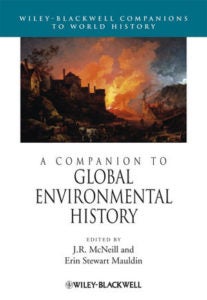
John McNeill, co-editor with Erin Stewart Mauldin
A Companion to Global Environmental History
Wiley-Blackwell, 2012
This volume brings together essays written by environmental historians from around the world, including scholars from South Africa, Brazil, Germany, and China. Expert contributions explore environmental processes, thought, and action from prehistory to the present, providing a historical, cultural, and political context for engagement with the environment in modern times. The book offers multiple points of entry into the history and historiography of global environmental history, providing an essential road map to past developments, current controversies, and future developments for specialists and newcomers alike.
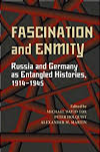
Michael David-Fox, co-editor with Peter Holquist & Alexander Martin
Fascination and Enmity: Russia and Germany as Entangled Histories, 1914-1945
University of Pittsburgh Press, 2012
Russia and Germany have had a long history of significant cultural, political, and economic exchange. Despite these beneficial interactions, stereotypes of the alien Other persisted. Germans perceived Russia as a vast frontier with unlimited potential, yet infused with an “Asianness” that explained its backwardness and despotic leadership. Russians admired German advances in science, government, and philosophy, but saw their people as lifeless and obsessed with order. Fascination and Enmity presents an original transnational history of the two nations during the critical era of the world wars. By examining the mutual perceptions and misperceptions within each country, the contributors reveal the psyche of the Russian-German dynamic and its use as a powerful political and cultural tool.
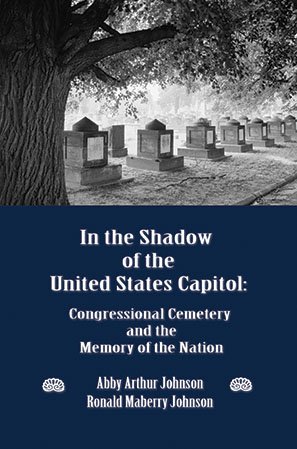
Ronald Johnson & Abby Arthur Johnson
In the Shadow of the United States Capitol: Congressional Cemetery and the Memory of the Nation
New Academia Publishing, 2012
This book is a chronological history of Congressional Cemetery, the “nation’s first national burial ground,” established in 1807 long before the national military cemetery was founded at Arlington in 1864. 55,000 individuals are interred in this one-of-a-kind national public cemetery, including a long list of distinguished Americans—Civil War photographer Matthew Brady, Marine Band Director John Philip Sousa, and Belva Lockwood, the first female candidate for President of the U.S. (1884 and 1888). The book uses the long history of the Cemetery to explore the nature of historic memorials more broadly in the construction of national memory.
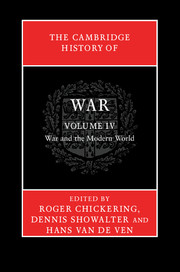
Roger Chickering, co-editor with Dennis Showalter & Hans van de Ven
The Cambridge History of War, Vol. IV: War and the Modern World
Cambridge, 2012
Volume IV of the Cambridge History of War offers a definitive new account of the war in the twentieth century. In twenty-three chapters, leading historians trace the global evolution of warfare from about 1850 to the 1990s. They explore how industrialization and nationalism fostered vast armies whilst the emergence of mobile warfare and improved communications systems made possible the “total warfare” of the two world wars. This volume is a comprehensive guide to every facet of modern war from strategy and operations to its social, cultural, technological, and political contexts and legacies.

Emmett Curran, ed.
John Dooley’s Civil War: An Irish American’s Journey in the First Virginia Infantry Regiment
The University of Tennessee Press, 2012
Among the finer soldier-diarists of the Civil War, John Edward Dooley first came to the attention of readers when an edition of his wartime journal, edited by Joseph Durkin, was published in 1945. That book, John Dooley, Confederate Soldier, became a widely used resource for historians, who frequently tapped Dooley’s vivid accounts of Second Bull Run, Antietam, and Gettysburg, where he was wounded during Pickett’s Charge and subsequently captured.
As it happens, the 1945 edition is actually a much-truncated version of Dooley’s original journal that fails to capture the full scope of his wartime experience—the oscillating rhythm of life on the campaign trail, in camp, in Union prisons, and on parole.

Emmett Curran
Shaping American Catholicism: Maryland and New York, 1805-1915
The Catholic University of America Press, 2012
A study of the American Catholic Church’s experience in its two most important regions of influence, the North East and the South East—specifically New York and Maryland—in the years from 1805 to 1915, and the rivalry that ensued between these two regions regarding the leadership of the church in American and in the Society of Jesus.
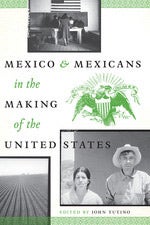
John Tutino, ed.
Mexico and Mexicans in the Making of the United States
The University of Texas Press, 2012
This story of Mexico and Mexicans and their contributions to the political, social, and economic foundations of the United States, from colonial to present times, has for a long time been obscured by headlines about illegal immigration and Mexico’s drug wars. This volume of essays, in totality, explores the cultural legacies of colonial New Spain that have profoundly shaped both Mexico and the United States.

Nancy Tucker
The China Threat: Memories, Myths, and Realities in the 1950s
Columbia University Press, 2012
This book examines the Eisenhower administration’s policy toward China from 1953 to 1961. Tucker argues that while President Eisenhower saw strategic relations with China as integral to U.S. diplomacy, his anxiety about anti-communist domestic politics impeded his ability to engage Congress and the public effectively on China.
Gábor Ágoston
Osmanli’da Strateji ve Askerî Güc (Strategy and Military Power in the Ottoman Empire)
Timas Yayinlari, Istanbul 2012
This book is a collection of nine essays on Ottoman strategy and military power from the fifteenth through the late eighteenth centuries. Written originally in English and translated into Turkish (with some modifications for the Turkish readership), the essays examine Ottoman strategies of conquest and rule, information gathering and imperial ideology, military technology, and weapons production, and military and fiscal transformations during this time period. The essays question some of the old views of the Eurocentric and Orientalist schools of thought regarding Ottoman “backwardness” and military decline and study the waning of Ottoman military power by comparing Ottoman military, bureaucratic and fiscal developments to those of the Habsburgs and Romanovs.

Richard Kuisel
The French Way: How France Embraced and Rejected American Values and Power
Princeton University Press, 2012
There are over 1,000 McDonald’s on French soil. Two Disney theme parks have opened near Paris in the last two decades. And American-inspired vocabulary such as “le weekend” has been absorbed into the French language. But as former French president Jacques Chirac put it: “The U.S. finds France unbearably pretentious. And we find the U.S. unbearably hegemonic.” Are the French fascinated or threatened by America? They Americanize yet are notorious for expressions of anti-Americanism. From McDonald’s and Coca-Cola to free markets and foreign policy, this book looks closely at the conflicts and contradictions of France’s relationship to American politics and culture. Richard Kuisel shows that France has charted its own path even as the French have used America as a yardstick and foil to mark their own distinct identity. Exploring cultural trends, values, public opinion, and political reality, The French Way delves into the complex relationship between two modern nations. Kuisel examines France’s role as an independent ally of the United States–in the reunification of Germany and in military involvement in the Persian Gulf and Bosnia–but he also considers the country’s failures in influencing the Reagan, Bush, and Clinton administrations. Whether investigating France’s successful information technology sector or its spurning of American expertise during the AIDS epidemic, Kuisel asks if this insistence on a French way represents a growing distance between Europe and the United States or a reaction to American globalization.
2011 Publications

Carol Benedict
Golden-Silk Smoke: A History of Tobacco in China, 1550-2010
University of California Press, 2011
From the long-stemmed pipe to snuff, the water pipe, hand-rolled cigarettes, and finally, manufactured cigarettes, the history of tobacco in China is the fascinating story of a commodity that became a hallmark of modern mass consumerism. Carol Benedict follows the spread of Chinese tobacco use from the sixteenth century, when it was introduced to China from the New World, through the development of commercialized tobacco cultivation, and to the present day. Along the way, she analyzes the factors that have shaped China’s highly gendered tobacco cultures and shows how they have evolved within a broad, comparative world-historical framework. Golden-Silk Smoke not only uncovers the long and dynamic history of tobacco in China but also sheds new light on global histories of fashion and consumption.
Michael David-Fox
Showcasing the Great Experiment: Cultural Diplomacy and Western Visitors to the Soviet Union, 1921-1941
Oxford University Press, 2011
During the 1920s and 1930s, thousands of European and American writers, professionals, scientists, artists, and intellectuals made a pilgrimage to experience the “Soviet experiment” personally. Showcasing the Great Experiment explores the reception of these intellectuals and fellow travelers and their cross-cultural and trans-ideological encounters in order to analyze Soviet attitudes toward the West. Many of the twentieth century’s greatest writers and thinkers, including Theodore Dreiser, André Gide, Paul Robeson, and George Bernard Shaw, notoriously defended Stalin’s USSR despite the unprecedented violence of its prewar decade. While many visitors were profoundly affected by their Soviet tours, so too was the Soviet system. The early experiences of building showcases and teaching outsiders to perceive the future-in-the-making constitute a neglected international part of the emergence of Stalinism at home. Michael David-Fox contends that each side critically examined the other, negotiating feelings of inferiority and superiority, admiration and enmity, emulation and rejection. By the time of the Great Purges, these tensions gave way to the dramatic triumph of xenophobia and isolationism; whereas in the twenties the new regime assumed it had much to learn from Western modernity, by the Stalinist thirties the Soviet order was declared superior in all respects.
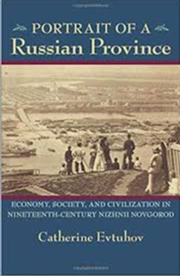
Catherine Evtuhov
Portrait of a Russian Province: Economy, Society, and Civilization in Nineteenth-Century Nizhnii Novgorod
University of Pittsburgh Press, 2011
An in-depth history of the Russian province of Nizhnii Novgorod, this book undermines conventional interpretations of Russia’s history and preconceived notions of nineteenth-century Russian society. It is commonly assumed that Russia had always labored under a highly centralized and autocratic imperial state. The responsibility for this lamentable state of affairs was ultimately assigned to the profoundly agrarian character of Russian society. The countryside, home to the overwhelming majority of the nation’s population, was considered a harsh world of cruel landowners and ignorant peasants, and a strong hand was required for such a crude society. A number of significant conclusions flowed from this understanding. Deep and abiding social divisions obstructed the evolution of modernity, as experienced “naturally” in other parts of Europe, so there was no Renaissance or Reformation; merely a derivative Enlightenment; and only distorted capitalism. And since only despotism could contain these volatile social forces, it followed that the 1917 Revolution was an inevitable explosion resulting from these intolerable contradictions—and so too were the blood-soaked realities of the Soviet regime that came after. In short, the sheer immensity of its provincial backwardness could explain almost everything negative about the course of Russian history. Through her close study of the province of Nizhnii Novgorod in the nineteenth century, Catherine Evtuhov demonstrates how nearly everything we thought we knew about the dynamics of Russian society was wrong. Instead of peasants ground down by poverty and ignorance, we find skilled farmers, talented artisans and craftsmen, and enterprising tradespeople. Instead of an exclusively centrally administered state, we discover effective and participatory local government. Instead of pervasive ignorance, we are shown a lively cultural scene and an active middle class. Rooted in, but going well beyond, provincial affairs, her book challenges us with an entirely new perspective on Russia’s historical trajectory: not one of Russian exceptionalism but rather one that is recognizable to any historian of nineteenth-century Europe.
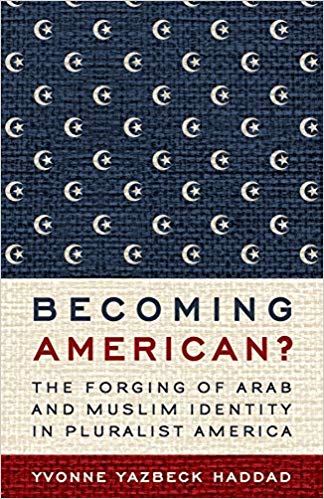
Yvonne Haddad
Becoming American? The Forging of Arab and Muslim Identity in Pluralist America
Baylor University Press, 2011
Countless generations of Arabs and Muslims have called the United States “home.” Yet while diversity and pluralism continue to define contemporary America, many Muslims are viewed by their neighbors as painful reminders of conflict and violence. In this concise volume, renowned historian Yvonne Haddad argues that American Muslim identity is as uniquely American it is for as any other race, nationality, or religion. Becoming American? first traces the history of Arab and Muslim immigration into Western society during the 19th and 20th centuries, revealing a two-fold disconnect between the cultures—America’s unwillingness to accept these new communities at home and the activities of radical Islam abroad. Urging America to reconsider its tenets of religious pluralism, Haddad reveals that the public square has more than enough room to accommodate those values and ideals inherent in the moderate Islam flourishing throughout the country. In all, in a remarkable, succinct fashion, Haddad prods readers to ask what it means to be truly American and paves the way forward for not only increased understanding but for forming a Muslim message that is capable of uplifting American society.
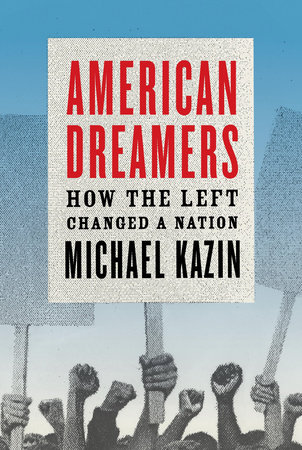
Michael Kazin
American Dreamers: How the Left Changed a Nation
Knopf, 2011
A panoramic yet intimate history of the American left—of the reformers, radicals, and idealists who have fought for a more just and humane society, from the abolitionists to Michael Moore and Noam Chomsky—that gives us a revelatory new way of looking at two centuries of American politics and culture. Michael Kazin—one of the most respected historians of the American left working today—takes us from abolitionism and early feminism to the labor struggles of the industrial age, through the emergence of anarchists, socialists, and communists, right up to the New Left in the 1960s and ’70s. While the history of the left is a long story of idealism and determination, it has also been, in the traditional view, a story of movements that failed to gain support from mainstream America. In American Dreamers, Kazin tells a new history: one in which many of these movements, although they did not fully succeed on their own terms, nonetheless made lasting contributions to American society that led to equal opportunity for women, racial minorities, and homosexuals; the celebration of sexual pleasure; multiculturalism in the media and the schools; and the popularity of books and films with altruistic and antiauthoritarian messages.
Deeply informed, at once judicious and impassioned, and superbly written, American Dreamers is an essential book for our times and for anyone seeking to understand our political history and the people who made it.
Joseph McCartin
Collision Course: Ronald Reagan, the Air Traffic Controllers, and the Strike that Changed America
Oxford University Press, 2011
In August 1981, the Professional Air Traffic Controllers Organization (PATCO) called for an illegal strike. The new president, Ronald Reagan, fired the strikers, establishing a reputation for both decisiveness and hostility to organized labor. As Joseph A. McCartin writes, the strike was the culmination of two decades of escalating conflict between controllers and the government that stemmed from the high-pressure nature of the job and the controllers’ inability to negotiate with their employer over vital issues. PATCO’s fall not only ushered in a long period of labor decline; it also served as a harbinger of the campaign against public sector unions that now roils American politics. Collision Course sets the strike within a vivid panorama of the rise of the world’s busiest air traffic control system. It begins with an arresting account of the 1960 midair collision over New York that cost 134 lives and exposed the weaknesses of an overburdened system. Through the stories of controllers like Mike Rock and Jack Maher, who were galvanized into action by that disaster and went on to found PATCO, it describes the efforts of those who sought to make the airways safer and fought to win a secure place in the American middle class. It climaxes with the story of Reagan and the controllers, who surprisingly endorsed the Republicans on the promise that he would address their grievances. That brief, fateful alliance triggered devastating miscalculations that changed America.
John Tutino
Making a New World: Founding Capitalism in the Bajio and Spanish North America
Duke University Press, 2011
Making a New World is a major rethinking of the role of the Americas in early world trade, the rise of capitalism, and the conflicts that reconfigured global power around 1800. At its center is the Bajío, a fertile basin extending across the modern-day Mexican states of Guanajuato and Querétaro, northwest of Mexico City. The Bajío became part of a new world in the 1530s when Mesoamerican Otomís and Franciscan friars built Querétaro, a town that quickly thrived on agriculture and trade. Settlement accelerated as regional silver mines began to flourish in the 1550s. Silver tied the Bajío to Europe and China; it stimulated the development of an unprecedented commercial, patriarchal, Catholic society. A frontier extended north across vast expanses settled by people of European, Amerindian, and African ancestry. As mining, cloth making, and irrigated cultivation increased, inequities deepened and religious debates escalated. Analyzing the political economy, social relations, and cultural conflicts that animated the Bajío and Spanish North America from 1500 to 1800, John Tutino depicts an engine of global capitalism and the tensions that would lead to its collapse into revolution in 1810.
2010 Publications
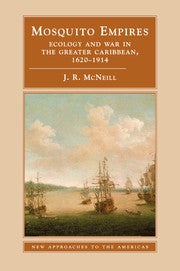
John McNeill
Mosquito Empires: Ecology and War in the Greater Caribbean, 1620-1914
Cambridge University Press, 2010
McNeill explores the links among ecology, disease, and international politics in the context of the Greater Caribbean – landscapes lying between Surinam and the Chesapeake – in the seventeenth through early twentieth centuries. Ecological changes made these landscapes especially suitable for the vector mosquitoes of yellow fever and malaria, and these diseases wrought systematic havoc among armies and would-be settlers. Because yellow fever confers immunity on survivors of the disease, and because malaria confers resistance, these diseases played partisan roles in the struggles for empire and revolution, attacking some populations more severely than others. In particular, yellow fever and malaria attacked newcomers to the region, which helped keep the Spanish Empire Spanish in the face of predatory rivals in the seventeenth and early eighteenth centuries. In the late eighteenth and nineteenth centuries, these diseases helped revolutions to succeed by decimating forces sent out from Europe to prevent them.
Osama Abi-Mershed
Apostles of Modernity: Saint-Simonians and the Civilizing Mission in Algeria
Stanford University Press, 2010
Between 1830 and 1870, French army officers serving in the colonial Offices of Arab Affairs profoundly altered the course of political decision-making in Algeria. Guided by the modernizing ideologies of the Saint-Simonian school in their development and implementation of colonial policy, the officers articulated a new doctrine and framework for governing the Muslim and European populations of Algeria. Apostles of Modernity shows the evolution of this civilizing mission in Algeria and illustrates how these 40 years were decisive in shaping the principal ideological tenets of French colonization of the region.
This book offers a rethinking of 19th-century French colonial history. It reveals not only what the rise of Europe implied for the cultural identities of non-elite Middle Easterners and North Africans, but also what dynamics were involved in the imposition or local adoptions of European cultural norms and how the colonial encounter impacted the cultural identities of the colonizers themselves.
